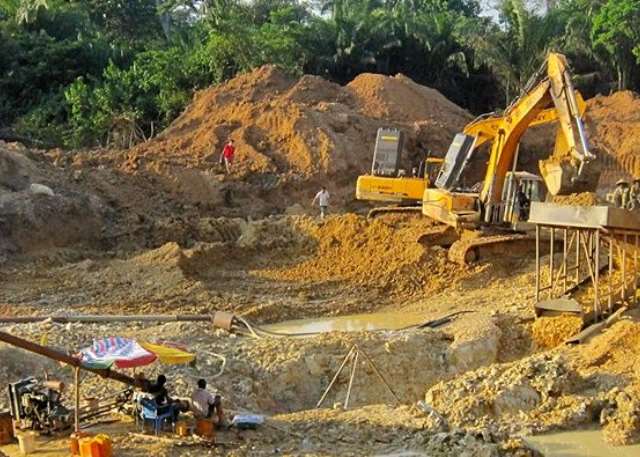In November 2022, Ghana’s the erstwhile government led by HE Nana Akufo-Addo stood alongside world leaders at COP27 to proudly launch the Forests and Climate Leaders’ Partnership (FCLP), which is a global initiative to protect vital ecosystems. That same month, however, its government quietly enacted Legislative Instrument 2462, an insidious law that opened the doors of forest reserves both protected and production to mining.
This was not just a contradiction, it was a betrayal and complete failure of Ghana’s government to the people’s trust. The same government that played climate champion abroad became a forest destroyer at home through LI 2462. Their global promises about saving forests were just for show, while their real actions opened forests reserves. In posture and action, they set in motion an avalanche of interests and destruction on our forests than ever before.
The public saw through the charade. The backlash was swift and sustained. Civil society, labor unions, religious institutions, professional associations, and community leaders rose in unison. Their message was clear: forests are not for sale.
Yet successive administrations, first under President Nana Akufo-Addo and now under President John Dramani Mahama, have treated environmental protection as a transactional issue, not a national imperative. The former government ignored years of evidence-based advocacy until economic pressure from labor unions forced a reluctant and ultimately hollow concession: a repeal instrument drafted just as Parliament recessed, ensuring no vote could be taken. In the same breath, it criminalized dissent, arresting 52 peaceful protesters demanding forest protections.
The battle over L.I.2462 has laid bare a painful reality in Ghana’s environmental governance: whether through outright resistance or hollow compromise, both past and present governments have systematically prioritized political and economic interests over the survival of the nation’s forests. This twin failure presents not just a cautionary tale, but a strategic roadmap for civil society to force real change.
The previous administration’s handling of L.I.2462 repeal demands revealed a
governance model allergic to environmental accountability. For years, the government met civil society’s evidence-based advocacy with indifference, only shifting from outright dismissal to performative action when faced with the one pressure point it could not ignore, the organized might of labor unions threatening economic disruption.
Even then, their response was cynically calculated: a repeal instrument conveniently drafted just as parliamentary sessions ended, ensuring no actual vote could occur. Meanwhile, the state criminalized dissent, arresting 52 peaceful protesters in a stark demonstration of its priorities. The lesson was unambiguous, without direct threats to economic stability or political power, ecological preservation would remain perpetually deferred, regardless of international commitments or constitutional obligations.
The current administration’s approach has proven equally disillusioning, though through different means. Campaigning on explicit repeal promises and riding a wave of environmental advocacy support, the government executed a classic bait-andswitch upon taking office. This government’s reversal on L.I. 2462 reveals a troubling disregard for proper legal process. After initially acknowledging the regulation’s illegitimacy, the current administration now defends in court what was clearly an unlawful overreach. The sequence exposes the manipulation: an improperly enacted mining regulation in 2022, lacking proper legislative foundation, later rubber-stamped by Act 1124 in 2025 in a blatant attempt to retroactively legitimize the indefensible. This manoeuvre keeps 90% of Ghana’s forests open to mining, unless there is an paradigm shift in government policy and future actions.
These parallel experiences, one of obstinate resistance, the other of strategic deception, demand a fundamental rethinking of environmental advocacy. Civil society must first recognize that policy victories require anticipating all forms of institutional resistance. The previous government taught us that traditional advocacy channels (dialogues, petitions, evidence-based reports) only succeed when complemented by disruptive tactics that impose tangible costs, as labor strikes have clearly demonstrated. The current administration reveals how even “friendly” governments require constant vigilance backed by measurable accountability frameworks that survive election cycles.
To reverse this trajectory, civil society must escalate its strategy:
Forge intersectional alliances that unite labor, faith, health, business, and education sectors to expand influence and shift the narrative from trees to livelihoods, water security, and national dignity. Globalize the accountability stakes, linking L.I. 2462 to international climate financing, trade deals, and Ghana’s standing in global sustainability rankings. Pursue dual-track resistance, combining constitutional litigation under Article 36(9) with permanent, high-visibility public mobilization that refuses to let the issue fade. Institutionalize mobilization infrastructure capable of weathering political transitions, deploying rapid-response tactics, and maintaining continuity across campaigns and administrations.
At its core, this is a fight about power, who wields it, and who can hold it accountable.
Ghana’s forests continue to decline because short-term political gains consistently trump long-term ecological survival. Empty appeals to government conscience won’t reverse this crisis, but only an unyielding, multi-pronged movement that transforms environmental protection from a negotiable policy into a non-negotiable national priority can succeed.
This is not just about laws on paper, but about water security for millions, climate resilience for all Ghanaians, the survival of vital biodiversity hotspots, and Ghana’s credibility on the global climate stage.
As the L.I. 2462 battle proves, meaningful change comes only through uncompromising, multifaceted pressure that leaves no room for evasion or empty compromise. Civil society’s task is clear: to build the coalitional power, tactical versatility, and relentless persistence that makes forest protection inescapable, not just a policy preference, but also a national imperative.
Looking forward, HE John Dramani Mahama has committed to amend the Minerals and Mining Act 703, to completely prohibit mining in forests reserves and this serves another opportunity to redeem his many promises of making mining in forest reserves a thing of the past. If President Mahama delivers on this pledge, it will stand as one of the most consequential environmental actions ever taken by a Ghanaian leader, providing transgenerational safeguards for forest reserves and the services they provide in Ghana.
Author: Daryl Bosu. Environmentalists. Deputy National Director A Rocha Ghana.
Daryl Bosu Email: [email protected]


